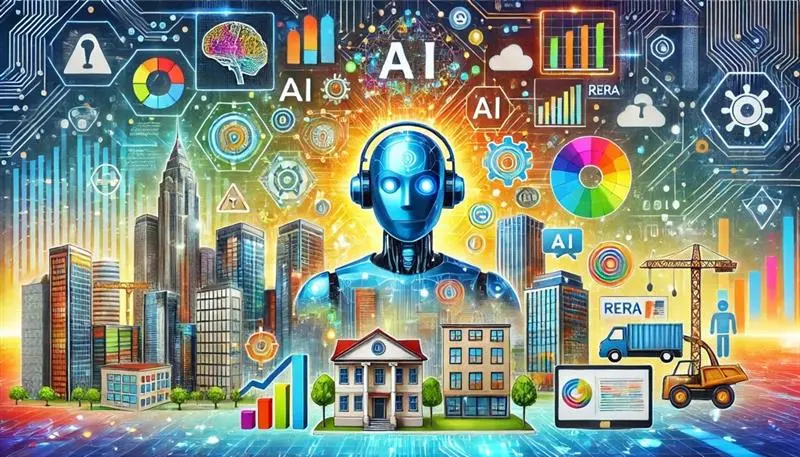The Indian real estate sector, valued at over $200 billion, is undergoing a paradigm shift, leveraging cutting-edge technologies to address long-standing inefficiencies and challenges. At the forefront of this transformation is Artificial Intelligence (AI), a technology capable of delivering predictive analytics, operational efficiency, and improved decision-making. With the introduction of the Real Estate (Regulation and Development) Act (RERA) and the rise of Real Estate Investment Trusts (REITs), AI is reshaping the landscape of Indian real estate in profound ways.
Harnessing AI in Real Estate: A Technical Overview
Predictive Analytics for Market Insights
AI systems, powered by machine learning (ML) algorithms, process historical data, demographic information, and market trends to forecast property values and demand patterns. These insights enable developers to:
- Select optimal locations for new projects.
- Predict future buyer behavior and preferences.
- Anticipate fluctuations in real estate pricing.
Automation in Operations
Robotic Process Automation (RPA) integrated with AI automates repetitive tasks such as property registration, title verification, and compliance documentation. This eliminates human errors and accelerates processes, particularly in regulatory filings under RERA.
Data-Driven Customer Engagement
AI-powered chatbots, like those based on Natural Language Processing (NLP), simulate human-like interactions, handling inquiries 24/7. These tools significantly improve customer engagement, offering tailored property recommendations based on user data.
AI-Driven Risk Management
Deep learning models identify patterns in transaction data to detect anomalies or potential fraud. For instance, verifying land titles or builder credentials against RERA records becomes seamless, reducing the risk of litigation or disputes.
AI and RERA: Transforming Regulatory Compliance
RERA mandates transparency, accountability, and timely delivery of real estate projects. The integration of AI into RERA-driven processes offers measurable advantages:
Real-Time Project Monitoring
- AI-powered drones and IoT-enabled sensors track construction progress, comparing actual timelines with promised schedules.
- Automated alerts are sent to developers and regulators when delays or deviations are detected.
Compliance Automation
- AI systems cross-check project documents with RERA requirements, flagging inconsistencies or missing elements instantly.
- Developers can use AI tools to ensure ongoing adherence to RERA regulations, minimizing penalties.
Smart Dispute Resolution
- By analyzing historical litigation data, AI models predict outcomes of disputes, offering potential resolutions or preemptive solutions.
- These tools assist RERA authorities in mediating disputes efficiently, reducing the backlog of cases.
Enhanced Transparency for Buyers
- AI-enabled platforms allow buyers to access project status, builder histories, and compliance records with minimal effort.
- Augmented reality (AR) and AI integration provide virtual property walkthroughs, enhancing decision-making for buyers remotely.
AI in REITs: Streamlining Investment Management
Real Estate Investment Trusts (REITs) are gaining traction in India as regulated investment vehicles offering diversification and liquidity. AI plays a pivotal role in maximizing the efficiency and profitability of REIT operations:
Asset Performance Optimization
- AI tools analyze data on occupancy rates, tenant behavior, and asset maintenance costs to identify underperforming assets.
- Predictive maintenance, powered by IoT and AI, ensures reduced downtime and cost-efficiency.
Investor Sentiment Analysis
- Sentiment analysis tools gauge market perception of REITs by analyzing social media, news, and financial reports, allowing managers to adjust strategies proactively.
Portfolio Risk Management
- AI models simulate various market conditions to assess potential risks, helping REIT managers make data-driven decisions.
- Predictive analytics anticipate market downturns, ensuring timely diversification.
Regulatory Reporting and Compliance
- Automated AI systems generate detailed compliance reports in alignment with SEBI and RERA guidelines, ensuring accuracy and timeliness.
More From Author: AI in Healthcare
Key Technical Challenges in AI Implementation
Data Integration and Standardization
- India’s fragmented property data system presents a significant hurdle. AI tools require standardized data sets across state and central databases for accurate insights.
Privacy and Cybersecurity Concerns
- Handling sensitive customer and project data requires robust cybersecurity frameworks. AI tools must comply with India’s evolving data protection laws.
Resistance to Adoption
- Smaller developers and firms may face financial or technical barriers to adopting AI solutions. Bridging this gap will require industry-wide collaborations and incentives.
Future Outlook: AI’s Role in Shaping Indian Real Estate
The confluence of AI with real estate regulations like RERA and financial instruments like REITs is creating a more transparent, efficient, and customer-centric industry. Here are some potential future developments:
- AI-Powered Smart Cities: AI’s integration with urban planning will lead to optimized city layouts, smart infrastructure, and sustainable resource management.
- Blockchain Synergy: Combining AI with blockchain technology can offer immutable land records, streamlined transactions, and fraud-proof property registries.
- Digital Twin Technology: Virtual replicas of real estate projects, created using AI, will enable real-time simulations for better project management and marketing.



![Latest AI Tools for Small Businesses [2025]](https://thenesterblog.com/wp-content/uploads/2025/05/AI-Tools-For-Small-Business-300x169.webp)

